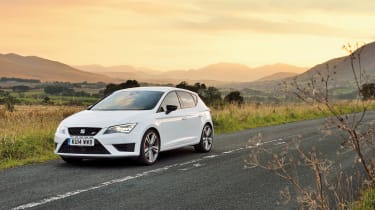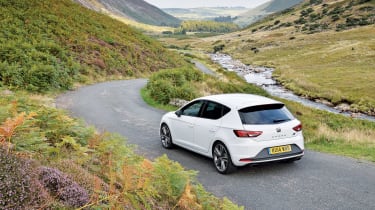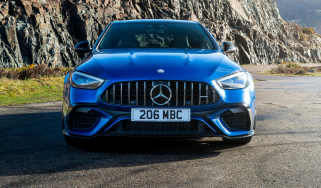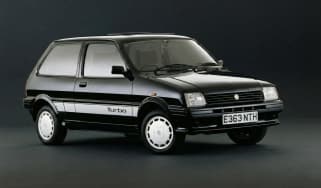SEAT Leon Cupra (2014-2021) review - more excitement than a Golf GTI?
The SEAT Leon Cupra is at the end of its lifespan, but has only become better with age
The SEAT Leon Cupra is officially dead. Well not quite, but the third iteration of the Leon Cupra, which is now off-sale, was indeed the last to come with a SEAT badge attached. But while its successor might have ditched the logo, it was also the first Leon Cupra that really made us stand up and listen, with seven years of brilliant hot hatchbacks and a few real stand-out performers along the way.
Of course the underlying make-up was good right from the start; it was an early adopter of the Volkswagen Group’s MQB platform (and that’s the first and last time we’ll utter those three letters together), utilised the excellent Audi-designed EA888 2-litre turbocharged engine and put them together in a sharp package wrapped in then SEAT lead designer Luc Donckerwolke styling.
> New 2020 Cupra Leon revealed – Cupra hits back with hot hatch and estate
What only made the package more interesting was SEAT’s tendency to pair high-output versions of that engine with simpler, lighter front-wheel-drive drivetrains than its Golf R and Audi S3 cousins, all backed up by chunky brakes and limited-slip differentials.
Towards the end, the range reduced to just the front-wheel-drive Cupra five-door hatchback and all-wheel-drive Cupra ST estate, both sharing the same turbocharged four-pot and seven-speed dual-clutch automatic in subtly different specs. A limited-edition Cupra R Estate was also available (for the moment) and was the pick of the range when fitted with the optional Abt tuning kit which we’ll go into in more detail later.
SEAT Leon Cupra in detail
- > Performance and 0-60mph time - Acceleration times are as you would expect for the class. ST and Cupra R Estate models are far quicker.
- > Engine and gearbox - 2-litre EA888 four-cylinder is familiar across the VW Group range. Here it makes up to 345bhp with the optional Abt performance package.
- > Ride and handling - Very quick and grippy, allowing for fantastic cross-country pace – but lacking in the last-word involvement of its most impressive rivals.
- > MPG and running costs - 30-plus mpg in the real world. Expect to chew through consumables if you're partial to trackdays.
- > Interior and tech - More imaginatively styled than the equivalent Golf but less carefully assembled. SEAT's in-car tech is aging, but easy to use.
- > Design - Still a sharp-looking car even this close to its end date. Top-spec Cupra R models somehow defy the questionable copper accoutrements.
Prices, specs and rivals
As noted above, the Cupra range shrunk quite substantially over the years, leaving just the two versions, with a single powertrain option in two outputs depending on whether you choose the hatchback or ST estate body.
More reviews
In-depth reviews
Reviews
- SEAT Leon FR 1.5 TSI 2020 review – a spicy chorizo to a Golf’s currywurst
- SEAT Leon review - a Golf fighter at every level
- SEAT Leon Cupra ST 300 Carbon Edition review – better than a VW Golf R estate?
- SEAT Leon ST Cupra 300 4Drive review - hot estate offers big boot and four-wheel drive
- SEAT Leon Cupra 300 2017 review - power boost for SEAT's Golf GTI rival
- Seat Leon Cupra 290 review - does power boost put Cupra into Golf R territory?
The Cupra hatch pricing started at £31,150, a figure that seemed about right for its performance and standard kit, which includes LED headlights, leather and Alcantara-trimmed sports seats, 19-inch alloy wheels, a chunky pair of exhaust outlets, dual-zone climate control and SEAT’s aging infotainment system controlled via the integrated touchscreen. This does include a digital dial pack though, which despite the relatively low-resolution display is perfectly functional and customisable.
For an extra £1365, the Lux pack will swap out the standard sports seats for a set of buckets, which are nicely supportive and look great, adaptive cruise control, wireless phone charging and keyless entry and go. The Cupra ST estate was identically specced to the hatchback inside and out, and starts at £34,550, with the Lux taking that up to £35,915.
Topping the Leon range is the limited-edition Cupra R ST estate, which cost from £37,975, but adds plenty of tinsel to the package. Bespoke to the R estate is the extended use of copper inside and out, new front and rear bumper section borrowed from the previous Cupra R hatchback, four round exhaust outlets surrounded by a (real) carbonfibre diffuser section, a carbon rear wing, carbon inserts on the side skirts, bigger Brembo brake calipers, and a set of copper-finished alloy wheels that don’t look nearly as garish as they sound.
Finishing off the look is an Alcantara steering wheel and gear selector, which together with all the other upgrades make the Cupra R ST Estate feel worth its admittedly heavy price tag. Options are few and far between, but as specified on our Leon Cupra R ST estate Fast Fleet long-termer, the optional panoramic sunroof and Abt tuning kit only add to the already desirable package.
It is worth noting that while the SEAT Leon hasn’t changed markedly over the years, its rivals certainly have. Starting at the top, the Renault Mégane RS is priced from £27,995 in its most basic form. The Sports chassis version is our pick of the range, if only because its more nuanced suspension tune is better suited to UK roads than Cup chassis models. The Hyundai i30 N is another sub-£30k rival at £25,990, but you’ll have to spend £29,495 for the more able and rather excellent i30 N Performance. Other notable rivals include the fast but flawed Focus ST at £31,995 and our class champion, the Honda Civic Type R also at £31,995.
In the year 2020, we left out the Volkswagen Golf GTI, it’s because at the time of writing this original review, the most consummate of hot hatches was between its seventh and all-new eighth generations, the latter of which is now available with a mixed reception. The Mégane, Civic, Hyundai and indeed the SEAT itself will also be either refreshed or totally renewed in 2020, so expect a big year for the hot hatchback sector.





